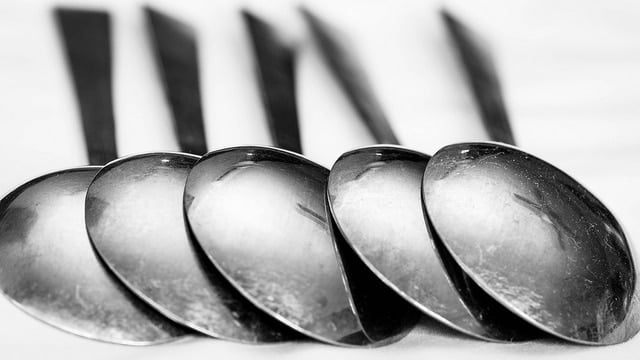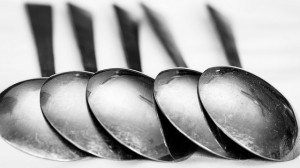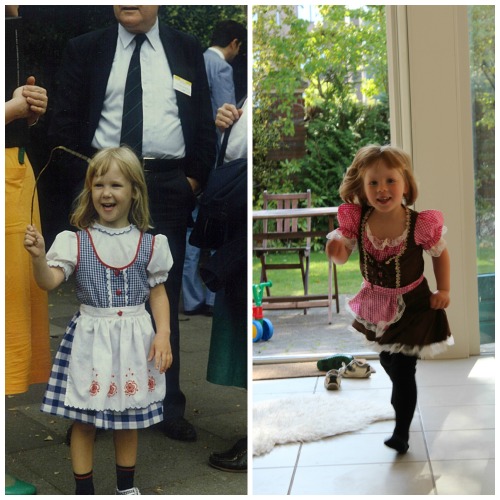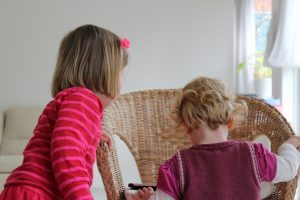
by Olga Mecking | Jun 2, 2014 | 2014, Awareness, Being Thankful, Child Care, Health, Kids, Life Balance, Maternal Health, Me-Time, Motherhood, Netherlands, Parenting, World Motherhood, Younger Children
 Recently, I’ve been reading about the Spoon Theory (also sometimes called the token theory). The idea is that we’re all given a certain amount of spoons (or tokens) each day—metaphorically of course–to spend on all the things that we need to get done during the day.
Recently, I’ve been reading about the Spoon Theory (also sometimes called the token theory). The idea is that we’re all given a certain amount of spoons (or tokens) each day—metaphorically of course–to spend on all the things that we need to get done during the day.
It is usually applied to explain disabilities or chronic illnesses, which often can’t be seen but still make people’s lives difficult (like Lupus, Chronic Pain or Aspbergers). But I actually think that, without dismissing the experiences of these people, the spoon theory also can be expanded to include moms.
Just think of all the things you have to do during the day, and then imagine doing them without children. You wouldn’t even have to think when you got dressed in the morning. Eating breakfast would be simple and effortless. You’d be able to get out of the house in a matter of minutes and you might even be able to get places on time.
When you’re a mom, suddenly everything takes more time. You don’t only have to make breakfast for yourself, you make it for one, two, three, or more people. Here go three spoons- and I don’t mean the ones you use to eat breakfast.
You want to get out of the house. You put your coat on, your children’s coats on. Your price in spoons depends on the amount of children you have and the season- less children cost less spoons, winter is more expensive than summer.
Whatever you do, whether you are a working mom or a SAHM, you likely will be out of spoons by the end of the day. Some days are better and you may even have a few spoons left. Some days are horrible and you run out of spoons before noon. The unexpected temper tantrum costs a spoon or three. Taking your child to the hospital because he’s sick is another five spoons.
Remember, you only get a certain amount of spoons per day and that amount is limited. You can borrow the spoons from the next day but that could be the very day your child gets sick or when she decides that from now on, she will absolutely refuse to do whatever you ask her to do.
But not all moms are given equal amounts of spoons. Some have less than others. These are the moms who have disabled children. These are single moms with two jobs and no support. These are the moms all over the world living in poverty. They struggle every day to provide the best for their children. Yes, parenting under such circumstances is definitely more spoon-costly.
But it isn’t easy even for a family without such challenges. So what can we do? Spend our spoons wisely. Prioritize.
For example, in my case, perfectly folded laundry isn’t worth a spoon but a nicely prepared dinner most definitely is. We can try to replenish our spoons by getting some me-time. We can remember to sleep. We can get help- whether it’s from family, friends or childcare.
These are the things we can do for ourselves. But there are also things we can do for others. When thinking about how to spend your spoons or tokens, please set aside a certain amount for your fellow moms. You can do it by offering support. Offer a shoulder to cry on, extend your helping hand, say encouraging words.
It may seem like spending your own precious spoons but it is really a kind of investment. Because any price is easier to pay if everyone pitches in.
But, all economic and metaphorical imagery aside, I just want to point out the obvious: motherhood is hard. Let’s be kind to ourselves. And let’s help each other out.
Of course, we don’t really need such theories to explain how hard it it so be a mom. But I thought the spoon theory is a rather good way to illustrate the challenges of motherhood.
What are you thoughts on this? Is it helpful to think of your day in terms of having a limited number of spoons (or tokens) to spend?
This is an original post to World Moms Blog from our Polish writer in the Netherlands, Olga Mecking.
The image used in this post is credited to Nicki Mannix. It holds a Flickr Creative Commons attribution license.
Olga is a Polish woman living in the Netherlands with her German husband. She is a multilingual expat mom to three trilingual children (even though, theoretically, only one is trilingual since she's old enough to speak). She loves being an expat, exploring new cultures, learning languages, cooking and raising her children. Occasionally, Olga gives trainings in intercultural communication and works as a translator. Otherwise, you can find her sharing her experiences on her blog, The European Mama. Also take a while to visit her Facebook page .
More Posts - Website
Follow Me:




by Olga Mecking | Apr 21, 2014 | 2014, Awareness, Being Thankful, Bilingual, Communication, Family, Health, Humanity, Humor, Kids, Language, Life Balance, Maternal Health, Motherhood, Netherlands, Parenting, Siblings, World Motherhood, Younger Children
 One of my very favourite human qualities is a sense of humour. I must confess that I sometimes find people lacking this wonderful quality, as boring. It isn’t nice of course but I believe a sense of humour is paramount to any human’s well being or even survival. Especially if you’re a mom.
One of my very favourite human qualities is a sense of humour. I must confess that I sometimes find people lacking this wonderful quality, as boring. It isn’t nice of course but I believe a sense of humour is paramount to any human’s well being or even survival. Especially if you’re a mom.
I love all kinds of humour: simple, sophisticated, absurd, or even black humour. By the latter, I mean of course, serious matters that are funny.
When my days are filled with screams and cries and tantrums, the only thing that keeps me afloat is laughing about it. And when I share my pearls of wisdom on Facebook, not only does it make me feel better, it makes others feel better, too. I also love reading snarky, funny, honest posts that make me nod my head in agreement. When times are hard, humour helps me survive.
We all know that parenting is tough and humour can help with that as well. I, for one, rely heavily on it. When my daughter refuses to put on her jacket, I ask her to put on her pj’s. Then her bathing suit. Then her bathrobe. She laughs, says no to all I suggest and puts on her jacket without any problems. That is, obviously provided that I actually remember to laugh instead of to yell.
I often try to persuade my big girl that I have 10 legs. She kindly and patiently explains that no I really can’t have 10 legs. “Why?” I ask her. She tries to explain that humans only have 2 legs but to no avail. I really need to know why I only have 2 legs, not 10. I mean, 2 legs, how lame is that! At some point, she cracks up and so do I and we both laugh until we can’t laugh anymore.
So you see, it is not very surprising that I want my children to have a sense of humour and a big one at that. Puns, laughter and jokes are normal in our house. And already, I begin seeing it in my children. For instance, I loved a recent conversation with my three-year old.
“Mama?”- she asks me, with a glint in her eye, and a smile playing in the corner of her mouth.
“Yes, J?”- I answer, wondering what she’s going to say.
“Mama?”- she repeats, her tone still serious but the smile more visible.
“Yes, J?”- I repeat, not sure what to think of it.
“Pee-Pah-Paw!” she says, out of nowhere, her laughter filling the house. “Pee-pah-paw”- I say, and soon the whole family joins her till our bellies hurt.
My baby has a mischievous smile that makes my heart melt. When he laughs, I think I’m the luckiest mom on Earth. I ‘m sure that he too will grow up to have a sense of humour, just like his sisters.
I especially love when they make multilingual jokes, like “Ja-vocado” and “Nie-vocado” (“ja” is “yes” in German while “nie” means “no” in Polish). When asked what a ja-vocado is, my eldest daughter said that it’s a fruit that is yellow on the outside and pink on the inside and it is sweet and very delicious and that she likes it a lot.Funny that she can imagine liking fruit that doesn’t even exist.
I am always surprised how many functions humour can have: it can help you through tough times. It can turn a rejection into cooperation, in children and adults alike. It makes children clever and great with languages. It makes us see things in a different way.This is why I feel it is so important.
I’m not funny all the time, though and that’s fine. It’s OK to be sad sometimes. I won’t pretend that my day is better than it is. But when I remember, I find in myself the strength to stick my tongue out at the universe and say: “Pee-Pah-Paw”. And laugh until my belly hurts.
Are you raising your kids to have a sense of humour or appreciate humour?
This is an original post to World Moms Blog from our writer in the Netherlands, Olga Mecking.
The image used in this post is credited to cherijoyful. It holds a Flickr Creative Commons attribution license.
Olga is a Polish woman living in the Netherlands with her German husband. She is a multilingual expat mom to three trilingual children (even though, theoretically, only one is trilingual since she's old enough to speak). She loves being an expat, exploring new cultures, learning languages, cooking and raising her children. Occasionally, Olga gives trainings in intercultural communication and works as a translator. Otherwise, you can find her sharing her experiences on her blog, The European Mama. Also take a while to visit her Facebook page .
More Posts - Website
Follow Me:




by Olga Mecking | Feb 3, 2014 | 2014, Awareness, Being Thankful, Bilingual, Culture, Education, Expat Life, Humanitarian, Inspirational, Language, Life Lesson, Living Abroad, Millennium Development Goals, Motherhood, Moving, Netherlands, Philanthropy, Shot@Life, Social Good, Stress, World Motherhood
 Until a friend of mine had a terrible tragic accident in the Himalaya mountains that left her in a coma, I had never donated to a charity. We collected some money at our wedding to give to her husband, and my mom also donated some money to a charity that takes care of her, but that was it.
Until a friend of mine had a terrible tragic accident in the Himalaya mountains that left her in a coma, I had never donated to a charity. We collected some money at our wedding to give to her husband, and my mom also donated some money to a charity that takes care of her, but that was it.
Since moving to another country and having children, I have been looking for ways to help others. I want to donate to more charities. I am just looking for the right one.
It isn’t easy. I have heard of many charities that have turned out to be scams or which just took people’s money and ran.
My situation is especially difficult because I live in a foreign country and do not know about the charities here. Though my Dutch is fluent, I still have trouble communicating in this language sometimes. In the Netherlands, many people go house-to-house collecting money for charities.
I think it is interesting to find out about charities that way because they’re often ones I’ve never heard of before. They are often small scale actions rather than big ones. But I think the mistake they’re making is the following one: before I contribute, I’d like to find out more about the organization, whether my friends have heard of it, whether there is something about them that raises red flags.
I think I might even agree to donate money if they were willing to leave a business card or something I could find them by. Instead, they want me to make a monthly commitment. Again, because I do not know them, I am not so keen on giving them my credit card number.
At the same time, my heart breaks for all the little children going through invasive treatments; who are terminally ill; who look like little ghosts because they have lost so much weight from all their chemo; for all the sick people who can’t get the treatment they need; or for children who are not so fortunate as mine; or moms in poorer countries, who have to travel for many days if they want to give birth in a hospital.
I really want to help. Since I became a mom and later a World Moms Blog contributor, I have been made aware of needs and dreams that can’t be fulfilled because of the bad conditions all around the world.
But the fact is that finding the right charity isn’t easy. I mostly say no to these door-to-door people. I do it with a heavy heart. I just want to make sure that I am really helping people in need, and not wasting my money.
Luckily, while looking for a charity to donate to, there is a lot I can do:
- In my circle of friends alone, there have been situations where help was needed, including domestic violence and pregnancy problems.
- I am considering taking the Shot@Life pledge and becoming a Champion.
- I can learn as much as I can about actions such as #MDG’s and participate in our Twitter Parties.
- I can find local communities, organizations, charities and brands.
- Many of my friends are absolutely talented people and use their talents to collect money for a good cause, and I can help them spread the word and participate.
I know this sounds like nothing, and I am not telling this to show off how good of a person I am. It is just to show that even though it sounds like nothing, we all can make a difference. I am still very new at this social good cause. I still have a lot to learn. Already I have asked my fellow World Moms Blog contributors for help choosing a charity I can actually trust and they have come up with great charities.
I need to do more. I want to do more. I will do more.
Do you have a charity or cause worth supporting? Tell us about it and help spread the word
This is an original post to World Moms Blog from Olga Mecking in The Netherlands.
The image used in this post is credited to Images Money. It holds a Flickr Creative Commons attribution license.
Olga is a Polish woman living in the Netherlands with her German husband. She is a multilingual expat mom to three trilingual children (even though, theoretically, only one is trilingual since she's old enough to speak). She loves being an expat, exploring new cultures, learning languages, cooking and raising her children. Occasionally, Olga gives trainings in intercultural communication and works as a translator. Otherwise, you can find her sharing her experiences on her blog, The European Mama. Also take a while to visit her Facebook page .
More Posts - Website
Follow Me:




by Olga Mecking | Oct 28, 2013 | 2013, Motherhood, World Motherhood

Left: The author, Olga Mecking, when she was growing up in Germany. Right: Olga’s daughter today in the Netherlands.
Sometimes, I find myself rediscovering simple truths about life in general and parenting in particular. My latest epiphany is this: “My child is not me.”
On the contrary to all the books and articles out there that tell us that we will grow into our parents, I don’t think this is the case. I think that while our parents influence our lives, we’re still separate individuals with our own thoughts, ideas and opinions.
And never has this simple truth rung more true to me than it has when my eldest daughter started school. I’ve been very worried about sending her to school at the tender age of four. I thought back to my old school days and worried and worried. And worried some more because my experiences weren’t all that great.
But this is when I realized: my child is not me! Pretty much everything about her will be different.
I was born and raised in communist Poland and went to school shortly before Communism fell. As much as I love my country, going to school in these times wasn’t so great.
We had to learn everything by heart. Language teachers weren’t too good. Classes were huge and the teachers were strict, even to the point of giving bad grades for pretty much anything. Nobody knew anything about bilingualism, and I was even lucky to have German classes offered at my school, as bad as they were.
But my child is not me.
She goes to school in a modern, Western country and has been speaking 3 languages from birth. Her teacher is amazing and lets the children play a lot. They go outside for recess and learn letters and numbers, and they even went on a school trip. In my daughter’s school, it is normal to speak two or more languages.
As a child, I was shy and timid. My idea of a good day was, and still is, to stay at home and read a book. School proved to be too much for me at times: too loud, too big. On the other hand, I was often told to sit still, be organized, and listen when all I really wanted to do was run around.
But my child is not me.
She seems to be more of an extrovert than I ever was. She could be outside all the time, playing, jumping, swinging, playing with other children; and, she seems to enjoy school.
I even often receive photos from her teachers. Guess who of all the children in the pictures has the biggest smile? My blond beautiful daughter.
When I went to school, we were taught about computers, but seldom used them for school. We were told that learning is hard work and were given grades for our work, even for our paintings. After school, I totally stopped painting.
But my child is not me.
She thinks learning is fun and can use all the great apps for learning, and she has a great selection of books in all the languages that she’s learning. She loves getting her hands dirty with paint and uses them to paint on a large piece of paper. She paints the funniest creatures and people, and she gives them funny names.
My daughter and I both have straight blond hair. Many people tell me she looks like me. I think I have an idea who she got her willpower and stubbornness from, but my child, she’s not completely me.
This is an original post to World Moms Blog by Olga Mecking in the Netherlands.
Photo credit to the author.
Olga is a Polish woman living in the Netherlands with her German husband. She is a multilingual expat mom to three trilingual children (even though, theoretically, only one is trilingual since she's old enough to speak). She loves being an expat, exploring new cultures, learning languages, cooking and raising her children. Occasionally, Olga gives trainings in intercultural communication and works as a translator. Otherwise, you can find her sharing her experiences on her blog, The European Mama. Also take a while to visit her Facebook page .
More Posts - Website
Follow Me:




by Olga Mecking | Sep 12, 2013 | Multicultural, Netherlands, Preschool, Technology, Uncategorized, World Moms Blog, World Motherhood
 I am raising digital natives and I love it. Technology is a big part of our lives. My brother-in-law once jokingly asked: “Is there a pen in this highly digitalized household?”
I am raising digital natives and I love it. Technology is a big part of our lives. My brother-in-law once jokingly asked: “Is there a pen in this highly digitalized household?”
“iPad” was among my now 2-year old’s first 50 words. When we Skype with my parents, sometimes my 4-year old gets tired and tries to swipe my father’s image away because she thinks that my laptop has a touchscreen.
There are many ways to approach digitalization. Some parents, bloggers and researchers focus on the negative impact digital technology (and technology in general) can have on our lives. They give tips on reducing screen time, warn against oversharing and treat technology as something that needs to be tightly controlled.
Others are amazed by the opportunities that technology offers us. They mention the community- building aspects of social media platforms, the opportunity to access information everywhere and at any time, and remark that our lives have been made much easier by digital technology.
Where do I stand on this? More in the technology-is-awesome camp.
As an expat, I appreciate the possibilities to not only hear my parents’ voices, but to also see them- and they can see the children. I can use my iPad to do yoga with the children, and to connect with them that way. We don’t have a TV, but instead we use our computers to watch TV series and movies, and read the news. I love taking pictures and I have a digital SLR. That way, I can take tons of photos to choose the very best. And I haven’t even touched on the great advantages I get from blogging. My hands rebel when I try to draw or paint, but my computer allows me to do just that.
I view technology as a tool that can be used to our advantage without taking control over our lives. I think that there is a time and place for everything. I love the term “digital natives”. Just as our children can teach us how to speak another language, we can learn to use all these wonderful devices and find delight in using them.
On the other hand, we can teach children to use technology and social media responsibly. I also think that we can teach them the world of paper books and sounds without a picture, and the world outside of the house rather than the world inside of their devices.
To me it is obvious that technology has much to offer in terms of education and play. But I believe that through technology we not only can connect with a device, but with our children (and grandchildren!) as well.
What is your approach to modern technology? Do you love it or hate it?
This is an original post to World Moms Blog from our writer and mother of two in the Netherlands, Olga Mecking.
The photograph used in this post was taken by the author.
Olga is a Polish woman living in the Netherlands with her German husband. She is a multilingual expat mom to three trilingual children (even though, theoretically, only one is trilingual since she's old enough to speak). She loves being an expat, exploring new cultures, learning languages, cooking and raising her children. Occasionally, Olga gives trainings in intercultural communication and works as a translator. Otherwise, you can find her sharing her experiences on her blog, The European Mama. Also take a while to visit her Facebook page .
More Posts - Website
Follow Me:




 Recently, I’ve been reading about the Spoon Theory (also sometimes called the token theory). The idea is that we’re all given a certain amount of spoons (or tokens) each day—metaphorically of course–to spend on all the things that we need to get done during the day.
Recently, I’ve been reading about the Spoon Theory (also sometimes called the token theory). The idea is that we’re all given a certain amount of spoons (or tokens) each day—metaphorically of course–to spend on all the things that we need to get done during the day.














